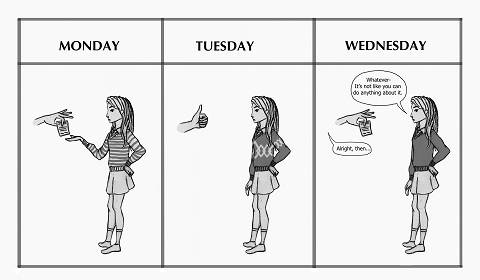
Presently, students receive demerits for ditching class, talking back to teachers and violating the Uniform Code. Although we on the UltraViolet feel that the uniform is not important enough to warrant a harsher demerit system, we do feel that more serious offenses should be handled separately, with larger and more meaningful punishments because the threat of receiving a demerit no longer seems to be enough to prevent girls from defying the rules.
Both students and faculty seem to consider Uniform Code violation demerits to be trivial. Why else would only a small faction of teachers consistently hand out demerits to girls who are out of uniform? But behavioral offenses should not be considered as unimportant as wearing the wrong color socks. For students, all demerits seem to have little to no effect on the girl that receives them. While a nominal point system supposedly weighs certain demerits more than others and the accumulation of three to four demerit points makes a student’s Citizenship grade go down by a full letter grade, a concrete punishment only kicks in when girls achieve a Citizenship grade of D+ or lower. And even this, a few community service hours, is not a large enough deterrent; at most, four hours will be assigned, which usually involves menial tasks like organizing a faculty member’s desk, not intensive or humiliating work that will prevent future misdemeanors. What’s more, it is difficult for students to even stack up the necessary number of slips to warrant punishment because slates are wiped clean at the end of the first semester, and the maximum amount of points a girl can receive at any one time is three. Additionally, the Citizenship grade is neither factored into a student’s GPA nor put on her college transcript. As a result, girls who only stack up ten demerit points rather than the 11 that it takes to receive a D+ go practically scot-free.
We at The UltraViolet believe that a new disciplinary system must be created so that girls receive appropriate punishment when they act out and therefore will be discouraged from misbehaving. Uniform violations should no longer be handled with demerits but should have their own “uniform slips,” the accumulation of a certain number of which would result in a light form of punishment. More serious infractions such as impudence to teachers should incur a different type of slip, accompanied by stricter disciplinary actions that would require fewer misdeeds to be enacted. For example, if it took five of these behavioral demerit slips to incur some form of punishment rather than the present 11, students would receive more negative reinforcement and hopefully change their behavior.




